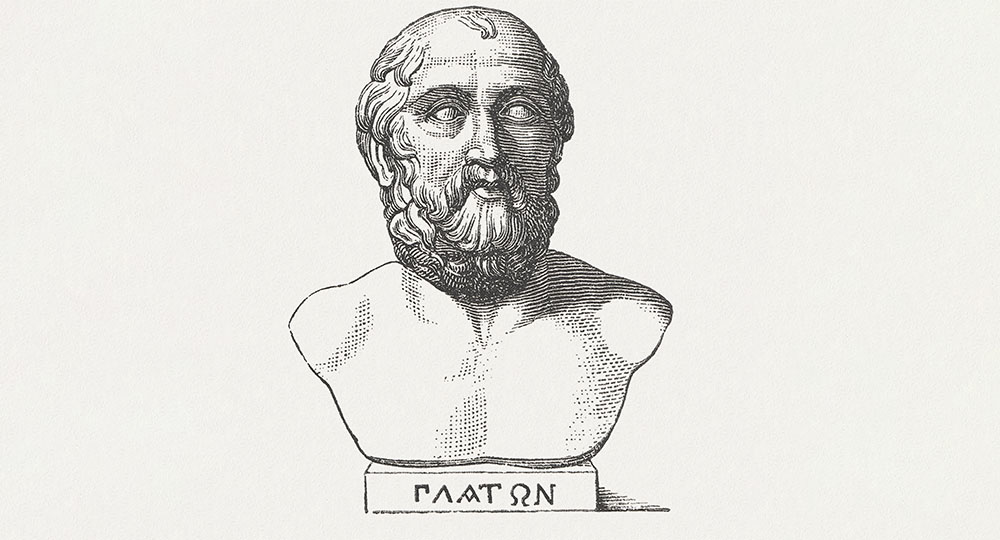Plato Versus the Bible
At first glance, Plato’s theory of forms seems to have positive traits. It attempts to satisfy the seeking heart’s cry, “There has to be more to life than this!” and points searching souls to a world beyond what we can see. But that’s as far as it goes.
Plato’s theory is deficient. It is fallen man’s best attempt to figure out reality and the meaning of life based solely on natural revelation (the world around us), without the help of special revelation (the Bible). The theory is mere speculation and exemplifies what the apostle Paul taught in Romans 1:18–22: “[They] became futile in their thoughts, and their foolish hearts were darkened. Professing to be wise, they became fools” (vv. 21–22).
Plato’s “forms” (justice, beauty, and goodness) are impersonal. He did not comprehend that these elements are actually attributes of an eternal, personal God who defines the concepts by His very Being.
Furthermore, no biblical evidence exists to support Plato’s assertion that human souls preexisted. Various theological views deal with the soul’s origin, but the best view maintains that it was created by God at the same time as Adam’s body (Gen. 2:7) and is passed down generationally from Adam.
Nor does Plato’s theory recognize mankind’s inherent problem: sin. To Plato, there was no such thing, only lack of virtue and ignorance of wisdom. To him, the good life did not involve a right relationship with God but, rather, a right relationship with knowledge and wisdom.
His theory also wrongly implies that material things cannot be as good as spiritual things.
However, spiritual does not always mean “nonmaterial.” For example, when the children of Israel wandered in the wilderness, they “all ate the same spiritual food, and all drank the same spiritual drink” (1 Cor. 10:3–4). The food and drink were both material, but they were of divine, spiritual origin and considered spiritual. Since God is spirit (Jn. 4:24), what originates with God is also spiritual because it comes from Him—including an eternal, personal relationship with Him. That spiritual relationship involves beings possessing material bodies.
Furthermore, God created everything, material and immaterial, and called them not merely good but “very good” (Gen. 1:31). Can anyone argue with God’s assessment of His own creation?
If material substances were not good, then how do we explain the material body Jesus Christ had while on Earth? We would have to conclude that His physical body was inherently evil.
The second-century heretics, the Gnostics, addressed this issue by claiming Christ did not have an actual, material body, but merely the appearance of one. However, the apostle John anticipated this heresy and refuted it: “That which was from the beginning, which we have heard, which we have seen with our eyes, which we have looked upon, and our hands have handled, concerning the Word of life” (1 Jn. 1:1; emphasis added).
Jesus was not a ghost. He possessed a literal, material body that could eat food and be touched by others. And though glorified, Jesus still has a literal, material body in heaven that is sitting at the right hand of the Father.
Material objects are not in themselves unreal, let alone evil. All material things, including human bodies, currently experience the corruption and disintegration that come with sin; but this fact does not make them evil. One day all believers in Christ will receive material, resurrected bodies impervious to the disease and corruption we suffer today.
Plato’s “forms” are a theory; God’s Scripture is truth. And God has chosen the simple yet powerful message of the gospel to bring human souls out of darkness and into the light of His reality (2 Cor. 4:6). As Paul wrote in 1 Corinthians 1:20–24,
Where is the wise? Where is the scribe? Where is the disputer of this age? Has not God made foolish the wisdom of this world? For since, in the wisdom of God, the world through wisdom did not know God, it pleased God through the foolishness of the message preached to save those who believe. For Jews request a sign, and Greeks seek after wisdom; but we preach Christ crucified, to the Jews a stumbling block and to the Greeks foolishness, but to those who are called, both Jews and Greeks, Christ the power of God and the wisdom of God.








Wow this is a wonderful article…man I can’t get over the point regarding the “nonmaterial”, and I’d also never heard about the ghost Jesus ideas. I sure am glad I read this one.
Thanks for writing this.
Hi Mr. Scott
I love this article. I’m thinking that Plato’s philosophy has led to the heresies of cults like JW, and Islam etc. There seems to be a direct connection between the idea that physical things are “bad” and spiritual things are good. I also think that while it’s extremely important to have a solid foundation in theology, Christians need to know more of early Church history and the heresies present at the time and that infiltrated into aspects of the cults. Was allegorization of scripture developed out of Plato’s philosophy? Christians need to understand how this impacted church theology e.g. the belief that the millennium is spiritual not physical.